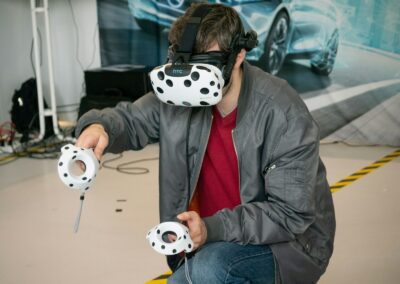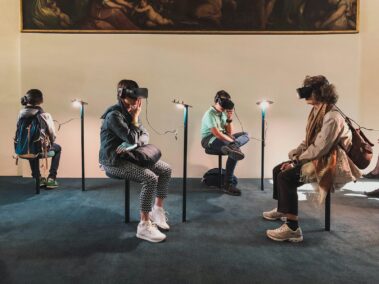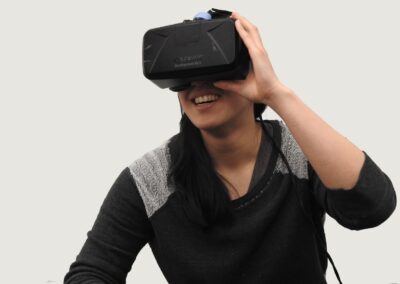Shaping the Future of Tourism with Virtual Reality
The Rise of Virtual Reality in Tourism
Virtual Reality (VR) is revolutionizing the tourism and travel industry by providing immersive experiences that allow users to explore destinations from the comfort of their homes. As cities like Riyadh and Dubai in Saudi Arabia and the UAE invest in cutting-edge technologies, VR is becoming an integral part of their tourism strategies. This innovative approach offers potential travelers a taste of their next destination, helping them make informed decisions and enhancing their overall travel planning experience.
The appeal of VR in tourism lies in its ability to create realistic and engaging simulations of destinations. Users can virtually walk through historic landmarks, explore natural wonders, and experience cultural events in a highly interactive manner. This not only enhances their excitement and anticipation but also provides valuable insights into what they can expect. For example, prospective tourists can explore the magnificent architecture of Riyadh’s Kingdom Centre or experience the luxury of Dubai’s Burj Al Arab before booking their trips.
However, as VR becomes more prevalent in tourism, ethical considerations surrounding its development and deployment come to the forefront. Ensuring that VR experiences are authentic, respectful of cultures, and accessible to diverse audiences is crucial for maintaining the integrity and inclusivity of tourism. In regions like Riyadh and Dubai, where cultural heritage and modern innovation coexist, addressing these ethical issues is essential for the sustainable growth of VR in tourism.
Authenticity and Cultural Representation in VR Tourism
One of the primary ethical concerns in VR tourism is the authenticity of the virtual experiences. For VR to be a valuable tool in tourism, it must accurately represent the destinations and their cultural significance. Misrepresentation or oversimplification of cultural aspects can lead to a distorted view of the destination, which can mislead tourists and disrespect the local culture. In Saudi Arabia and the UAE, where cultural heritage is deeply valued, ensuring that VR experiences are authentic and respectful is paramount.
Creating authentic VR tourism experiences involves collaboration with local experts and communities. This ensures that the virtual representations accurately reflect the cultural nuances and historical context of the destinations. For instance, a VR tour of Riyadh’s historical sites should include input from historians and local residents to capture the essence of the city’s rich heritage. Similarly, a virtual experience of Dubai’s modern attractions should consider the perspectives of those who live and work there to provide a genuine portrayal.
Moreover, ethical VR tourism should prioritize inclusivity and accessibility. This means designing VR experiences that cater to a diverse audience, including people with disabilities. Providing options for different languages and ensuring that the technology is user-friendly can make VR tourism more inclusive. In regions like Riyadh and Dubai, where tourism is a major economic driver, creating inclusive VR experiences can attract a broader range of visitors and enhance their overall satisfaction.
Data Privacy and Ethical Use of VR Technology
Another critical ethical consideration in VR tourism is the issue of data privacy. VR experiences often collect personal data to enhance user interactions and tailor the experience to individual preferences. However, the collection and use of this data must be handled with utmost care to protect users’ privacy and build trust. In Saudi Arabia and the UAE, where digital privacy is a growing concern, implementing robust data protection measures is essential for the ethical deployment of VR in tourism.
To address these concerns, companies developing VR tourism experiences should adopt transparent data privacy policies. Users should be informed about what data is being collected, how it will be used, and who will have access to it. Obtaining explicit consent from users before collecting their data is a fundamental ethical practice. Additionally, implementing strong security measures to protect the data from unauthorized access and breaches is crucial.
Furthermore, the ethical use of VR technology extends to the impact it has on local communities and environments. While VR can reduce the physical impact of tourism by allowing virtual visits, it should not replace the value of real-world experiences. Companies should promote VR as a complement to, rather than a substitute for, actual travel. Encouraging tourists to visit destinations in person supports local economies and fosters a deeper appreciation of the culture and environment.
Business Strategies for Ethical VR Tourism
Developing Responsible VR Tourism Business Models
For businesses in the tourism sector, adopting ethical VR practices is not only a moral obligation but also a strategic advantage. Responsible VR tourism can enhance brand reputation, build customer loyalty, and drive sustainable growth. In regions like Saudi Arabia and the UAE, where cities such as Riyadh and Dubai are global tourism hubs, developing ethical business models for VR tourism can set a benchmark for the industry.
One approach to developing responsible VR tourism business models is to engage in corporate social responsibility (CSR) initiatives. This can involve collaborating with local communities to create VR content, investing in the preservation of cultural heritage, and supporting environmental sustainability. By aligning VR tourism initiatives with broader CSR goals, businesses can contribute positively to the communities they feature in their virtual experiences.
Moreover, businesses should adopt a customer-centric approach that prioritizes the well-being and satisfaction of their users. This includes providing accurate and respectful representations of destinations, ensuring data privacy, and offering accessible VR experiences. By putting customers first, businesses can build trust and foster long-term relationships with their audience. In Riyadh and Dubai, where customer experience is a key focus, adopting such practices can enhance the competitiveness of VR tourism businesses.
Additionally, businesses should continuously evaluate and improve their VR tourism offerings. This involves gathering feedback from users, monitoring the ethical implications of their practices, and staying informed about the latest developments in VR technology and ethics. By maintaining a commitment to continuous improvement, businesses can ensure that their VR tourism experiences remain ethical, relevant, and engaging.
Leadership and Management in Ethical VR Tourism
Effective leadership and management are crucial for the successful implementation of ethical VR tourism practices. Leaders in the tourism sector must champion ethical standards and foster a culture of responsibility within their organizations. In regions like Saudi Arabia and the UAE, where visionary leadership drives innovation, adopting ethical leadership practices can inspire others in the industry to follow suit.
One key aspect of ethical leadership in VR tourism is setting clear ethical guidelines and expectations for employees and partners. This involves developing a code of conduct that outlines ethical practices related to authenticity, data privacy, and inclusivity. Leaders should communicate these guidelines clearly and ensure that they are integrated into the day-to-day operations of the business. By establishing a strong ethical foundation, leaders can create a culture of integrity and accountability.
Furthermore, leaders should invest in training and development programs that equip employees with the skills and knowledge needed to navigate ethical challenges in VR tourism. This includes training on cultural sensitivity, data privacy, and inclusive design. By empowering employees to make ethical decisions, leaders can ensure that their organizations uphold high ethical standards in their VR tourism initiatives.
In addition to internal efforts, leaders should engage with external stakeholders, including industry peers, regulators, and local communities, to promote ethical practices in VR tourism. Collaborative efforts can lead to the development of industry-wide standards and best practices that benefit all stakeholders. In regions like Riyadh and Dubai, where collaboration and innovation are highly valued, such initiatives can enhance the overall ethical landscape of VR tourism.
Project Management and Ethical VR Implementation
Effective project management is essential for the successful implementation of ethical VR tourism initiatives. Project managers play a critical role in ensuring that VR experiences are developed and deployed in line with ethical guidelines and business objectives. In regions like Saudi Arabia and the UAE, where large-scale projects are common, integrating ethical considerations into project management practices can drive better outcomes and enhance the overall success of VR tourism projects.
One important aspect of ethical project management is thorough planning and risk assessment. Project managers should identify potential ethical risks associated with VR tourism and develop strategies to mitigate them. This includes evaluating the authenticity of VR content, ensuring data privacy, and addressing potential impacts on local communities. By proactively managing risks, project managers can prevent ethical issues from arising and ensure that VR tourism projects are executed responsibly.
Additionally, project managers should prioritize stakeholder engagement throughout the project lifecycle. This involves collaborating with local communities, cultural experts, and other stakeholders to ensure that VR experiences are respectful and inclusive. Regular communication and feedback loops can help project managers identify and address ethical concerns in a timely manner. In Riyadh and Dubai, where stakeholder engagement is critical for project success, adopting such practices can enhance the ethical standards of VR tourism projects.
Moreover, project managers should implement robust monitoring and evaluation processes to assess the ethical impact of VR tourism projects. This involves tracking key performance indicators related to authenticity, data privacy, and inclusivity, and making adjustments as needed. By continuously evaluating and improving their practices, project managers can ensure that VR tourism projects uphold high ethical standards and deliver meaningful experiences to users.
Conclusion: Embracing Ethical Practices for Sustainable VR Tourism
In conclusion, ethical considerations are paramount in the development and deployment of virtual reality for tourism and travel. By prioritizing authenticity, inclusivity, and data privacy, regions like Saudi Arabia and the UAE can leverage VR to enhance their tourism offerings while maintaining high ethical standards. For business executives, mid-level managers, and entrepreneurs, adopting ethical practices in VR tourism is key to achieving sustainable growth and fostering a culture of responsibility and innovation. By leading with ethical principles and promoting responsible innovation, business leaders can ensure a sustainable and beneficial future for VR tourism in their organizations and communities.
#VirtualReality #Tourism #EthicalConsiderations #VRinTravel #AI #Blockchain #Metaverse #GenerativeAI #ModernTechnology #BusinessSuccess #Leadership #ManagementSkills #ProjectManagement #SaudiArabia #UAE #Riyadh #Dubai























